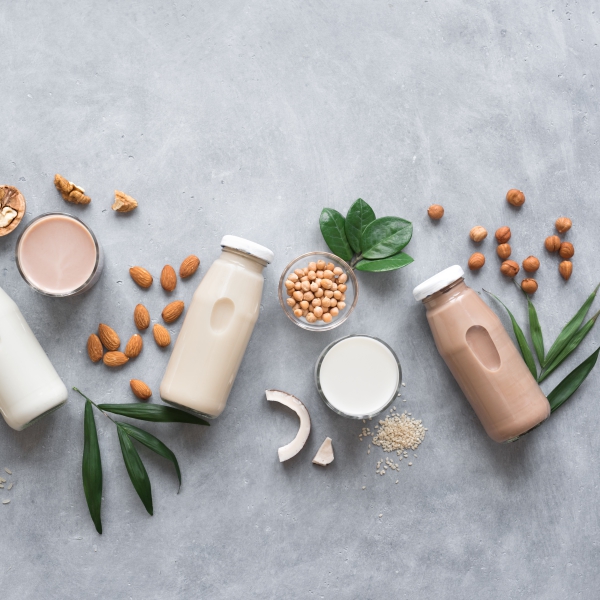คุณรู้ไหมโปรตีนพืช มีประโยชน์กว่าที่คิด
Plant-based protein หรือโปรตีนพืช ซึ่งมักพบได้มากจากพืชตระกูลถั่วและธัญพืช เมื่อเปรียบเทียบปริมาณโปรตีนต่อน้ำหนัก 100 กรัม จะพบว่าปริมาณโปรตีนจากพืช เทียบเท่าปริมาณโปรตีนจากเนื้อสัตว์เลยทีเดียว
คุณค่าโปรตีนต่อ 100 กรัม เทียบเท่ากับ
- เนื้อวัว หรือ เนื้อหมู 23 กรัม
- ถั่วเหลือง 36 กรัม
- ข้าวโอ๊ต 17 กรัม
- ควินัว 14 กรัม
- เมล็ดฟักทอง 19 กรัม
อีกทั้งยังมี Phytonutrient กรดอะมิโน วิตามิน และแร่ธาตุที่สำคัญต่อร่างกายหลายชนิด และที่สำคัญมีใยอาหารที่ดีต่อสุขภาพของลำไส้
นอกจากนี้โปรตีนพืช ยังมีคุณสมบัติต้านการอักเสบ และมีสารต้านอนุมูลอิสระ ช่วยลดความเสี่ยงจากโรคเรื้อรังหลายชนิด เช่น โรคมะเร็ง ความดันโลหิตสูง โรคหัวใจ
โปรตีนพืช เหมาะกับผู้สูงวัย เพื่อการดูดซึมที่ดี
เมื่ออายุเพิ่มขึ้น อัตราการสูญเสียมวลกล้ามเนื้อก็จะเพิ่มขึ้น ผู้สูงวัยจึงควรเสริมโปรตีนจากอาหารเพื่อซ่อมแซมส่วนที่สึกหรอ และเนื่องจากผู้สูงวัยมีการเปลี่ยนแปลงของระบบย่อยอาหารและการดูดซึมสารอาหารที่แย่ลง การรับประทานเนื้อสัตว์มากไปอาจทำให้มีอาการท้องอืด อาหารไม่ย่อยและขาดใยอาหารที่จะช่วยเรื่องของการขับถ่าย
โปรตีนจากพืช จึงเป็นตัวเลือกที่เหมาะสมเพราะดูดซึมง่าย พืชอย่างถั่วเหลืองจะมีกรดอะมิโนหลายชนิด เช่น ทริปโทเฟน (Tryptophan) ลิวซีน (Leucine) อาร์จีนีน (Arginine) ที่จำเป็นต่อการเสริมการทำงานของกล้ามเนื้อและสุขภาพผู้สูงวัย ทั้งยังมีใยอาหารที่ได้จากพืช ซึ่งจะทำให้ระบบขับถ่ายของผู้สูงวัยอยู่ในภาวะสมดุล ลดอาการท้องผูก ลดการดูดซึมของคอเลสเตอรอลและไขมันอีกด้วย
โปรตีนพืช แคลอรี่ต่ำ และใยอาหารสูง
เพราะพืชมีแคลอรี่ต่ำ มีใยอาหารสูง ทำให้อิ่มท้อง และเพิ่มจำนวนแบคทีเรียดีในลำไส้ ปรับสมดุลระบบขับถ่าย โดยที่ยังให้สารอาหาร วิตามิน และแร่ธาตุ จึงเหมาะกับคนที่กำลังควบคุมอาหาร หรือควบคุมน้ำหนัก อย่าลืมว่าโปรตีนก็มีส่วนสำคัญในการป้องกันการสูญเสียมวลกล้ามเนื้อ เพื่อการลดน้ำหนักอย่างสุขภาพดี
โปรตีนพืช ทางเลือกใหม่สำหรับผู้ออกกำลังกาย
คุณรู้ไหมว่าปัจจุบันผู้ออกกำลังกายหันมานิยมทานโปรตีนจากพืชมากขึ้น และยังมีกลุ่มผู้ออกกำลังกาย Body Builder ที่ทานมังสวิรัติอีกด้วย
เพราะการทานโปรตีนจากสัตว์ แม้ว่าจะได้โปรตีนปริมาณสูงแต่ก็มีไขมัน คอเลสเตอรอล และมีความสัมพันธ์กับโรคหลอดเลือดและหัวใจ โรคเบาหวาน หรือโรคมะเร็งบางชนิด ผู้ที่ออกกำลังกายและเล่นกีฬาที่ใส่ใจต่อสุขภาพจึงหันมาบริโภค Plant-based protein มากขึ้น
นอกจากนี้ยังเหมาะกับผู้ที่ต้องการเสริมกล้ามเนื้อ แต่มีภาวะ Lactose-intolerance ทำให้ไม่สามารถทานเวย์โปรตีนได้ โปรตีนพืชจึงเป็นอีกหนึ่งตัวเลือกในการเสริมโปรตีน
แหล่งที่มา:
- 15 best plant-based protein foods [Internet]. Medicalnewstoday.com. 2020 [cited 24 August 2020]. Available from: https://www.medicalnewstoday.com/articles/321474...
- What are the best sources of plant-based protein? [Internet]. NBC News. 2020 [cited 24 August 2020]. Available from: https://www.nbcnews.com/better/lifestyle/ask-nutritionist-what-are-best-sources-plant-based-protein-ncna982496
- The Link Between Red Meat and Cancer: What You Need to Know [Internet]. Health Essentials from Cleveland Clinic. 2020 [cited 24 August 2020]. Available from: https://health.clevelandclinic.org/link-red-meat-cancer-need-know/
- Kyle J Hackney, Kara Trautman, Nathaniel Johnson, Ryan Mcgrath, Sherri Stastny, Protein and muscle health during aging: benefits and concerns related to animal-based protein, Animal Frontiers, Volume 9, Issue 4, October 2019, Pages 12–17, https://doi.org/10.1093/af/vfz030
- Can plant-based proteins support healthy musculoskeletal ageing? | The Nutrition Society [Internet]. Nutritionsociety.org. 2020 [cited 24 August 2020]. Available from: https://www.nutritionsociety.org/papers/can-plant-based-proteins-support-healthy-musculoskeletal-ageing
- Publishing H. Is it safe to go vegan in older age? - Harvard Health [Internet]. Harvard Health. 2020 [cited 24 August 2020]. Available from: https://www.health.harvard.edu/staying-healthy/is-it-safe-to-go-vegan-in-older-age
- Soy Protein: Good or Bad? [Internet]. Healthline. 2020 [cited 24 August 2020]. Available from: https://www.healthline.com/nut.../soy-protein-good-or-bad...
- Gorissen, Stefan H M et al. “Protein content and amino acid composition of commercially available plant-based protein isolates.” Amino acids vol. 50,12 (2018): 1685-1695. doi:10.1007/s00726-018-2640-5
- Kubala J. Body Recomposition: Lose Fat and Gain Muscle at the Same Time [Internet]. Healthline. Healthline Media; 2018 [cited 2020Aug24]. Available from: https://www.healthline.com/nutrition/body-recomposition
- [Internet]. 2020 [cited 24 August 2020]. Available from: https://health.usnews.com/.../can-you-gain-muscle-while...
- 5 Plant-Based Foods to Help You Build Lean Muscle [Internet]. Healthline. 2020 [cited 24 August 2020]. Available from: https://www.healthline.com/.../5-plant-based-foods-for...
- Berrazaga I, Micard V, Gueugneau M, Walrand S. The Role of the Anabolic Properties of Plant- versus Animal-Based Protein Sources in Supporting Muscle Mass Maintenance: A Critical Review [Internet]. 2019 [cited 2020Aug24]. Available from: https://www.ncbi.nlm.nih.gov/pmc/articles/PMC6723444/
- Turner DZ. Plant-Based Protein Vs Whey Protein – Which One Is Better For Building Muscle? [Internet]. Men's Health. 2019 [cited 2020Aug24]. Available from: https://www.menshealth.com.au/plant-protein-vs-whey-protein




.jpg)